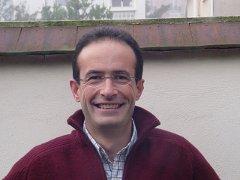Maxwell Colloquium - 6th February 2015
Theme: Stochastic Particle Methods
Registration for the event (free) here.
Keynote Speakers:
Pierre Del Moral

Pierre is a professor at the School of Mathemtics and Statisitcs at the University of New South Wales, Sydney. He is a world-class researcher in the field of Particle methods, Filtering, Sequential Monte Carlo and Mean Field approximations. He is one of the main developer of so called Particle Methods that are of increasing importance in simulations of a multidimensional complex system. Pierre’s research is on both theoretical and abstract mathematics but he also blends his result with applications in many important research areas such as: Propagations of chaos, Central limit theorems, Large deviation, Filtering and multiple object tracking, Bayesian Inference, Financial Mathematics, Biology and Chemistry. He has authored 7 books (4 research monograph) and over 100 research publications (many of them in the top journals). He also was involved in an impressive number of academic and industrial research projects.
Benjamin Jourdain

Benjamin is a professor at Ecole Nationale des Ponts et Chaussées in Paris. He is a head of the Applied Probability team at CERMICS, Head of the École Doctorale MSTIC Université Paris-Est and a member if the INRIA project-team MathRisk. He is renowned for his research on stochastic particle systems, Monte Carlo methods and probabilistic interpretations of the equations arising in fluid dynamics. His research intrets are: Probabilistic numerical methods in finance and molecular simulation : discretization of SDEs, variance reduction, MCMC ; Risk modeling in finance; Optimal transport and longtime behaviour of Markov processes; Probabilistic interpretation of nonlinear evolution equations as Fokker-Planck equations associated with stochastic processes; Approximation of these processes thanks to systems of interacting particles.
Preliminary Programme
All talks will take place at ICMS
Colloquium 6th February:
- 10:20 - 10:30 Opening
- 10:30 - 11:00 Michela Ottobre (Heriot-Watt)
- 11:00 - 11:30 Burak Buke (University of Edinburgh)
- 11:30 - 12:00 Goncalo dos Reis (University of Edinburgh)
- 12:00 - 13:30 Lunch Break
- 13:30 - 14:30 Benjamin Jourdain (CERMICS)
- 14:30 - 15:30 Pierre Del Moral (UNSW)
Mini Course 4th-5th February
Mini Course will take place at ICMS.
4th February:
- 13.30 - 15:30 Pierre Del Moral
- 15:30 - 16:00 Cofee break
- 16:00 - 17:30 Pierre Del Moral
5th February:
- 13.30 - 15:30 Pierre Del Moral
- 15:30 - 16:00 Cofee break
- 16:00 - 17:30 Pierre Del Moral
Titles and Abstracts
Pierre Del Moral
Title: An introduction to Feynman-Kac integration and genealogical tree based particle models.
Abstract: In the last three decades, there has been a dramatic increase in the use of particle methods as a powerful tool in real-world applications of Monte Carlo simulation in computational physics, population biology, computer sciences, and statistical machine learning. Ideally suited to parallel and distributed computation, these advanced particle algorithms include nonlinear interacting jump diffusions; quantum, diffusion, and resampled Monte Carlo methods; Feynman-Kac particle models; genetic and evolutionary algorithms; sequential Monte Carlo methods; adaptive and interacting Markov chain Monte Carlo models; bootstrapping methods; ensemble Kalman filters; and interacting particle filters. This lecture presents a comprehensive treatment of mean field particle simulation models and interdisciplinary research topics, including sequential Monte Carlo methodologies, genetic particle algorithms, genealogical tree-based algorithms, and quantum and diffusion Monte Carlo methods.
Benjamin Jourdain
Title: Multitype sticky particles and diagonal hyperbolic systems of PDEs.
Abstract: In dimension one, under the sticky dynamics, particles move with constant velocity between collisions and then stick together with conservation of the mass and momentum. According to Brenier and Grenier 1998, the large scale behaviour of this dynamics is given by the entropy solution to a scalar conservation law. Stability estimates in Wasserstein distance for such solutions was later proved by Bolley, Brenier and Loeper 2005.We introduce a multitype version of the sticky particles dynamics where each particle has a type, only sticks with particles of the same type and undergoes a velocity change when colliding a particle with another type. Under a uniform strict hyperbolicity assumption saying that the ranges of velocities for each type are disjoint intervals, we prove that the large scale behaviour of this dynamics is given by weak solutions to a diagonal hyperbolic system of PDEs. We then derive a Lp stability estimate on the particle system uniform in the number of particles. This allows to construct a nonlinear semigroup solving the system in the sense of Bianchini and Bressan 2005 and stable in Wasserstein distances of all orders. (joint work with J. Reygner)
Goncalo dos Reis
Title: Customized numerical schemes for FBSDEs.
Abstract: In this talk we introduce a family of explicit numerical approximations for the forward backward stochastic differential equations (FBSDEs). We show that newly developed methodology allows to analyse BSDEs with drivers having polynomial growth and that are also monotone in the state variable. This offers a probabilistic scheme for wide class of reaction-diffusion PDEs. Proposed schemes preserve qualitative properties of the solutions to the FBSDEs for all ranges of time-steps. (joint work with A. Lionnet and L. Szpruch )
Burak Buke
Title: Monte Carlo Methods for Stochastic Optimization.
Abstract: Monte Carlo methods are used extensively for assessing the solution quality in stochastic programs. It is known that the using sample average approximations provide us with a biased estimator of the optimal objective value. In this talk, we will review the literature on applications of Monte Carlo simulation in Stochastic programming. We also suggest a Monte Carlo method, which relies on estimating the objective value as a telescopic sum, and discuss how it helps us reduce the bias and variance in an efficient manner.
Michela Ottobre
Title: A Function Space HMC Algorithm with second order Langevin diffusion limit.
Abstract: We describe a new MCMC method optimized for the sampling of probability measures on Hilbert space which have a density with respect to a Gaussian; such measures arise in the Bayesian approach to inverse problems, and in conditioned di ffusions. Our algorithm is based on two key design principles: (i) algorithms which are well-defi ned in in finite dimensions result in methods which do not suff er from the curse of dimensionality when they are applied to approximations of the in finite dimensional target measure on R^N; (ii) non-reversible algorithms can have better ergodic properties compared to their reversible counterparts. The method we introduce is based on the hybrid Monte Carlo algorithm, tailored to incorporate these two design principles. (joint work with N. Pillai, F. Pinski and A. Stuart)

